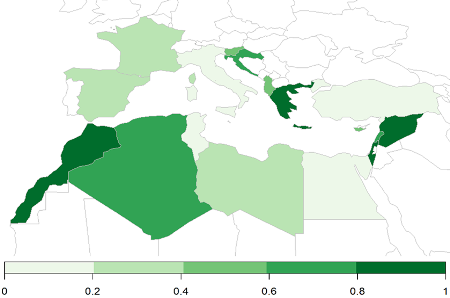
Mediterranean goat production systems: vulnerability to population growth and climate change
Abstract
In many Mediterranean countries, particularly those with substantive areas of marginal habitat that is unsuitable for crop production, small ruminant husbandry, especially goat production, is an important contributor to the national economy, rural livelihood and food security. In this study, the vulnerability of goat production in the Mediterranean region is modelled using vulnerability analysis, to consider the effects of changes in climate, human population and novel disease. A range of indicators derived from FAOSTAT and World Bank statistics are used. The model shows that southern Mediterranean nations are the most vulnerable, while Greece is the most vulnerable nation of the European Union (vulnerability score of 0.47 on a scale of zero to one, ranked seventh overall). The relatively higher adaptive capacity of France, Italy and Spain (scores of 1.00, 0.84 and 0.77 respectively on a scale of zero to one) is shown to counteract their high exposure (scores of 0.89, 0.91 and 0.96 for France, Spain and Italy respectively on a scale of zero to one) and reduce overall vulnerability (scores of 0.0, 0.05 and 0.13 for France, Spain and Italy respectively on a scale of zero to one). Morocco, the second most vulnerable nation of the Mediterranean with a vulnerability score of 0.81 (on a scale of zero to one), is selected to demonstrate the complexity of potential mitigating strategies and the interaction of the drivers of vulnerability.
Full Text:
PDFReferences
Kabubo-Mariara J. Global warming and livestock husbandry in Kenya: Impacts and adaptations. Ecol Econ. 2009 May;68:1915–24.
Wall R, Ellse L. Climate change and livestock parasites: integrated management of sheep blowfly strike in a warmer environment. Glob Chang Biol. 2011 May;17(5):1770–7.
Randolph SE. Dynamics of tick-borne disease systems: a minor role of recent climate change. Rev Sci Tech Int Des Epizoot. 2008;27:367–81.
Godber O, Wall R. Livestock and food security: vulnerability to population growth and climate change. Glob Chang Biol. 2014 Apr;20: 3092–102.
Smit B, Wandel J. Adaptation, adaptive capacity and vulnerability. Glob Environ Chang. 2006;16:282–92.
Watts M, Bohle H. The space of vulnerability: the causal structure of hunger and famine. Prog Hum Geogr. 1993 Mar;17(1):43–67.
Allison E, Perry A, Badjeck M, Neil Adger W, Brown K, Conway D, et al. Vulnerability of national economies to the impacts of climate change on fisheries. Fish Fish. 2009 Jun;10(2):173–96.
Haddad B. Ranking the adaptive capacity of nations to climate change when socio-political goals are explicit. Glob Environ Chang. 2005;15:165–76.
Decandia M, Yiakoulaki M, Pinna G, Cabiddu A, Molle G. Foraging behaviour and intake of goats browsing on Mediterranean shrublands. In: Cannas A, Pulina G, editors. Dairy Goats Feeding and Nutrition. Oxfordshire: CABI; 2008. p. 161–88.
Aziz M. Present status of the world goat populations and their productivity. Lohmann Inf. 2010;45(2):42–52.
Pollott GE, Wilson RT. Sheep and goats for diverse products and profits. FAO diversification booklet. Rome; 2009. Report No.: 9.
ICARDA. Characterization of Small Ruminant Breeds in West Asia and North Africa. Vol.2 (North Africa). Iniguez L, editor. Aleppo, Syria: ICARDA; 2005. 196 p.
Godber OF, Laroussi BF, Chentouf M, Wall R. Intensification of Mediterranean Goat Production Systems: A Case Study in Northern Morocco. Agriculture. 2016;6(2):16.
Haenlein GFW, Abdellatif MA. Trends in small ruminant husbandry and nutrition and specific reference to Egypt. Small Rumin Res. 2004;51(2):185–200.
Martin R, Linstӓdter A, Frank K, Müller B. Livelihood security in face of drought - Assessing the vulnerability of pastoral households. Environ Model Softw. 2016;75: 414–23.
Schilling J, Freier K, Hertig E, Scheffran J. Climate change, vulnerability and adaptation in North Africa with focus on Morocco. Agric Ecosyst Environ. Elsevier B.V.; 2012;156:12–26.
FAOSTAT. FAO Statistical Databases [Internet]. 2013 [cited 2013 May 23]. Available from: http://faostat.fao.org/
World Bank. The Little Data Book on Climate Change [Internet]. Washington, D.C.: The World Bank; 2012 [cited 2014 Jul 16]. 19-251 p. Available from: http://data.worldbank.org/sites/default/files/the-little-data-book-on-climate-change-2011.pdf
IFAD. Livestock and climate change. In: Livestock Thematic Papers: Tools for project design. International Fund for Agricultural Development, Rome; 2007. p. 1–19.
Rees W, Stammler F, Danks F, Vitebsky P. Vulnerability of European reindeer husbandry to global change. Clim Change. 2008 Dec;87(1-2):199–217.
FAO. World Livestock 2013 Changing disease landscapes. Slingenbergh J, Cecchi G, Engering A, Hogerwerf L, editors. Rome: FAO; 2013. 1-111 p.
World Bank. World DataBank [Internet]. 2013 [cited 2014 May 23]. Available from: http://data.worldbank.org/
Kaufmann D, Kraay A, Mastruzzi M. The worldwide governance indicators: methodology and analytical issues [Internet]. Policy Research. 2010 [cited 2014 Jul 22]. Report No.: 5430. Available from: http://journals.cambridge.org/abstract_S1876404511200046
R Core Team. R: A language and environment for statistical computing [Internet]. Version 2. Vienna: R foundation for statistical computing; 2012. Available from: http://www.r-project.org/
South A, Scutt-Phillips J, Rowlingson B, Bivand R, Foster P. rworldmap: mapping global data, vector and raster. R package [Internet]. 2012 [cited 2014 Jul 18]. Available from: http://cran. r-project.org/web/packages/rworldmap/index.html
RStudio. RStudio: Integrated development environment for R [Internet]. Boston, MA; 2012. Available from: http://www.rstudio.org/
Bahta S, Malope P. Measurement of competitiveness in smallholder livestock systems and emerging policy advocacy: An application to Botswana. Food Policy. 2014;49:408–17.
AAD. Les fondements de la Strategie Plan Maroc Vert [Internet]. 2013 [cited 2015 Nov 11]. Available from: http://www.ada.gov.ma/PlanMarocVert.php
Refbacks
- There are currently no refbacks.
